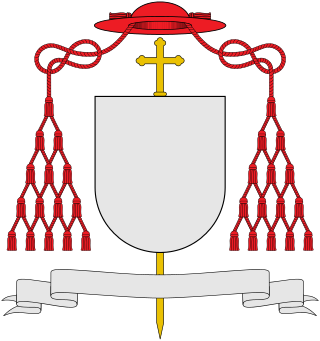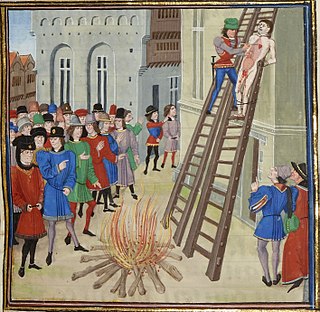See also
- Henry's law, a gas law in physical chemistry formulated by William Henry
Henry Law may refer to:
Canon or Canons may refer to:

A cardinal is a senior member of the clergy of the Catholic Church. Cardinals are created by the pope and typically hold the title for life. Collectively, they constitute the College of Cardinals. The most solemn responsibility of the cardinals is to elect a new pope in a conclave, almost always from among themselves, when the Holy See is vacant. During the period between a pope's death or resignation and the election of his successor, the day-to-day governance of the Holy See is in the hands of the College of Cardinals. The right to participate in a conclave is limited to cardinals who have not reached the age of 80 years by the day the vacancy occurs. In addition, cardinals collectively participate in papal consistories, in which matters of importance to the Church are considered and new cardinals may be created. Cardinals of working age are also appointed to roles overseeing dicasteries of the Roman Curia, the central administration of the Catholic Church.

A parish is a territorial entity in many Christian denominations, constituting a division within a diocese. A parish is under the pastoral care and clerical jurisdiction of a priest, often termed a parish priest, who might be assisted by one or more curates, and who operates from a parish church. Historically, a parish often covered the same geographical area as a manor. Its association with the parish church remains paramount.
In the canon law of the Catholic Church, the loss of clerical state is the removal of a bishop, priest, or deacon from the status of being a member of the clergy.
Canon is a Christian title usually used to refer to a member of certain bodies in subject to an ecclesiastical rule.
Willie, Billy, Bill, Will or William Henry may refer to:
Henry Rogers may refer to:
Henry Jones may refer to:
John Law may refer to:
The term "coadjutor" is a title qualifier indicating that the holder shares the office with another person, with powers equal to the other in all but formal order of precedence.
The Great Commandment is a name used in the New Testament to describe the first of two commandments cited by Jesus in Matthew 22:35–40, Mark 12:28–34, and in answer to him in Luke 10:27a:
... and one of them, a lawyer, asked him a question to test him. "Teacher, which commandment in the law is the greatest?" He [Jesus] said to him, "'You shall love the Lord your God with all your heart, and with all your soul, and with all your mind.' This is the greatest and first commandment. And the second is like it: 'You shall love your neighbor as yourself.' On these two commandments hang all the law and the prophets."
Henry White may refer to:
The Sacrament of Penance is one of the seven sacraments of the Catholic Church, in which the faithful are absolved from sins committed after baptism and reconciled with the Christian community. During reconciliation mortal sins must be confessed and venial sins may be confessed for devotional reasons. According to the dogma and unchanging practice of the church, only those ordained as priests may grant absolution.
In English ecclesiastical law, the term incumbent refers to the holder of a Church of England parochial charge or benefice. The term "benefice" originally denoted a grant of land for life in return for services. In church law, the duties were spiritual ("spiritualities") and some form of assets to generate revenue were permanently linked to the duties to ensure the support of the office holder. Historically, once in possession of the benefice, the holder had lifelong tenure unless he failed to provide the required minimum of spiritual services or committed a moral offence. With the passing of the "Pastoral Measure 1968" and subsequent legislation, this no longer applies, and many ancient benefices have been joined into a single new one.

To be hanged, drawn and quartered became a statutory penalty for men convicted of high treason in the Kingdom of England from 1352 under King Edward III (1327–1377), although similar rituals are recorded during the reign of King Henry III (1216–1272). The convicted traitor was fastened to a hurdle, or wooden panel, and drawn behind a horse to the place of execution, where he was then hanged, emasculated, disembowelled, beheaded, and quartered. His remains would then often be displayed in prominent places across the country, such as London Bridge, to serve as a warning of the fate of traitors. For reasons of public decency, women convicted of high treason were instead burned at the stake.
Henry Atkinson may refer to:
Coyne is a surname of Irish origin anglicised from the Gaelic Ó Cadhain meaning "descendant of Cadhan".
Henry Bishop may refer to:
Henry Richards may refer to:
Henry Staunton may refer to: